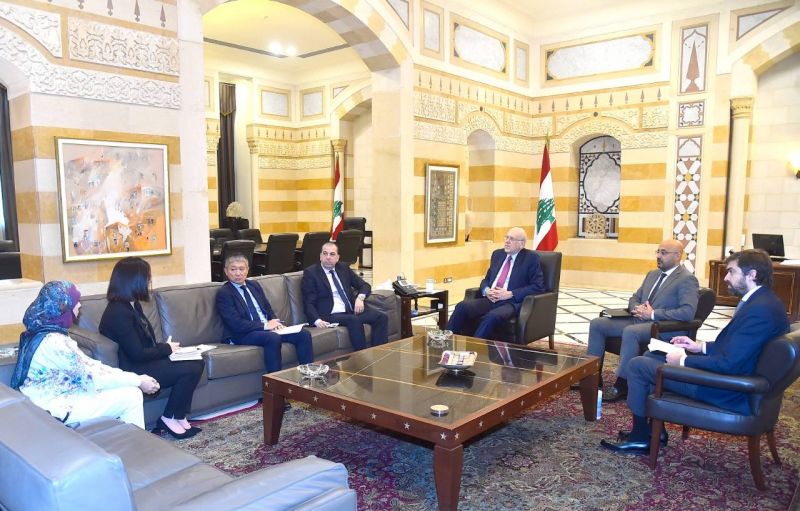
Caretaker Prime Minister Najib Mikati chairs a meeting on the outbreak of cholera with representatives from international organizations in Lebanon, at the Grand Serail, on Oct. 12, 2022. (Credit: Grand Serail/Twitter)
BEIRUT — A meeting was held Wednesday at the Grand Serail to discuss with international organizations a "roadmap" to fight the spread of cholera in Lebanon, according to the state-run National News Agency.
The Grand Serail also tweeted about the meeting, which was chaired by caretaker Prime Minister Najib Mikati, and held with representatives of the United Nations Children's Fund (UNICEF), the World Food Programme, and The United Nations High Commissioner for Refugees (UNHRC) in Lebanon.
“International organizations will bring support to all the infrastructures that provide water to the camps of the displaced Syrians to ensure its cleanliness," caretaker Environment Minister Nasser Yassin said. "They will ensure sewage stations and pumping water are supplied with diesel, especially in the camps in Baalbeck, Akkar, central Bekaa and west Bekaa."
The international NGOs will also provide chlorine to disinfect the water in all the pumping stations of these areas, he added.
The Lebanese Ministry of Energy was also asked to set up a functioning power line connecting all sewage and pumping stations for them to operate continuously. Awareness campaigns on hygiene and prevention will also be launched in "overcrowded" areas, Yassin stated.
The Ministry of Health has also confirmed that it is taking all measures related to examining water and sewages, analyzing samples and preparing hospitals.
Lebanon recorded its first cholera death, as well as eight new cases, on Wednesday, according to the country's Health Ministry. These new cases raised the total case count to 26, spread across North Lebanon.
Also on Wednesday, caretaker Minister of Health Firas Abiad is touring parts of Arsal with a delegation of international organizations, L'Orient Today's correspondent reported. The visit aims to assess the sanitary situation in the town. Abiad inspected a water well and the deployment of sanitation measures.
Abiad also toured some refugee camps in Arsal and highlighted "the importance of raising awareness on cholera in schools to ensure a safe and smooth academic year ahead." The minister also noted the importance of setting up mobile clinics to combat the "health crisis."
Abiad assured that all Lebanese patients contracting cholera will be treated at the expense of the Ministry of Health. The treatment fees of Syrian patients will be covered by the UNHCR.
As the Lebanese healthcare system has been hit hard by a three-year financial crisis and the August 2020 Beirut port blast that destroyed critical medical infrastructure in the capital, and despite humanitarian aid from donor countries, Abiad had said the sector would struggle to cope with a large-scale outbreak.
Reporting contributed by Sarah Abdallah